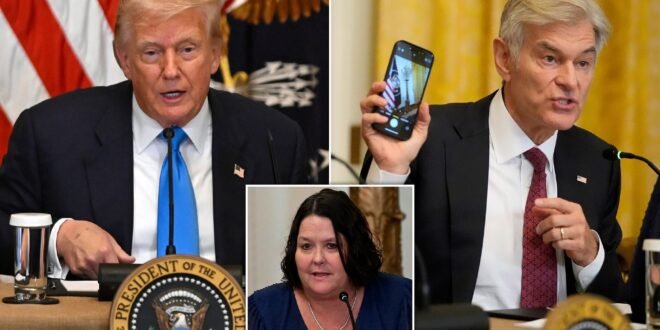A New Digital Health Ecosystem
President Donald Trump has drawn significant criticism for a proposal that would allow Americans to share their personal health data with private tech companies. During an event titled “Making Health Technology Great Again” held in the East Room, Trump introduced a plan aimed at revolutionizing the healthcare system by integrating advanced technology.
The Centers for Medicare & Medicaid Services (CMS) is working on securing commitments from leading tech companies such as Amazon, Apple, Google, and OpenAI. These collaborations are intended to create a ‘digital health ecosystem’ where individuals can upload their medical records to an app, making it easier to share information across different healthcare providers.
During the event, Trump emphasized the need for a high-tech upgrade in America’s healthcare networks, stating, “For decades, America’s healthcare networks have been overdue for a high tech upgrade – and that’s what we’re doing.” He highlighted that current systems are often slow, costly, and incompatible, but the new initiative aims to bring healthcare into the digital age.
Trump described the public-private partnership as a move away from traditional methods like clipboards and fax machines, promising a new era of convenience, profitability, and speed. He also claimed this approach could lead to better health outcomes for people.
However, online reactions were mixed, with many Americans expressing skepticism about the plan. Critics argued that the president was aligning with ‘big tech,’ suggesting potential corruption and a betrayal of national interests. One user on social media wrote, “More corruption and selling America out to big tech,” while others feared the risk of massive data breaches. Another comment warned, “I can see the headlines now, Millions of users have personal health data leaked.”
Lawrence Gostin, a law professor at Georgetown University specializing in public health, raised concerns about the ethical and legal implications of the proposal. He warned that patients should be worried about how their medical records might be used in ways that could harm them and their families.
CMS officials defended the plan by emphasizing that users would have to opt-in to participate in these services. They also highlighted the role of Amy Gleason, an adviser to CMS and the Department of Health and Human Services. Gleason, who is the acting administrator of the Department of Government Efficiency, played a key role in promoting the initiative.
Gleason gained attention earlier this year when it was revealed that she was actually in charge of the Trump administration’s DOGE efforts, not Elon Musk. She appeared in a promotional video by CMS and participated in a panel discussion with Trump, CMS Administrator Dr. Mehmet Oz, and HHS Secretary Robert F. Kennedy Jr.
In her speech, Gleason shared her personal experience with her daughter Morgan, who suffers from a rare disease. She recounted carrying a binder of paper records to every doctor’s appointment, highlighting the challenges of navigating the current system. Gleason expressed hope that access to modern AI tools could have led to a faster diagnosis for her daughter.
She described the daily struggles of her daughter, who takes 21 pills a day, receives two infusions monthly, and manages over 40 patient portals. Gleason noted that while her daughter’s condition is rare, her experience is common among many patients.
Gleason then encouraged the audience to imagine a future where healthcare is transformed through this partnership between big tech and government. She envisioned a scenario where her daughter could visit a doctor’s office and quickly transfer her medical information using a smartphone. Instead of filling out a clipboard with extensive details, Morgan could simply tap or scan a QR code to share her digital insurance card, verified medical records, and a summary to help her provider understand her condition more efficiently.
“We call this ‘kill the clipboard’ as President Trump said,” Gleason concluded, emphasizing the goal of streamlining the healthcare process.
 Info Malang Raya Its All About World News
Info Malang Raya Its All About World News




